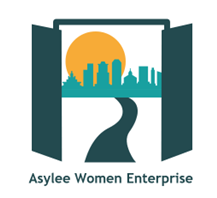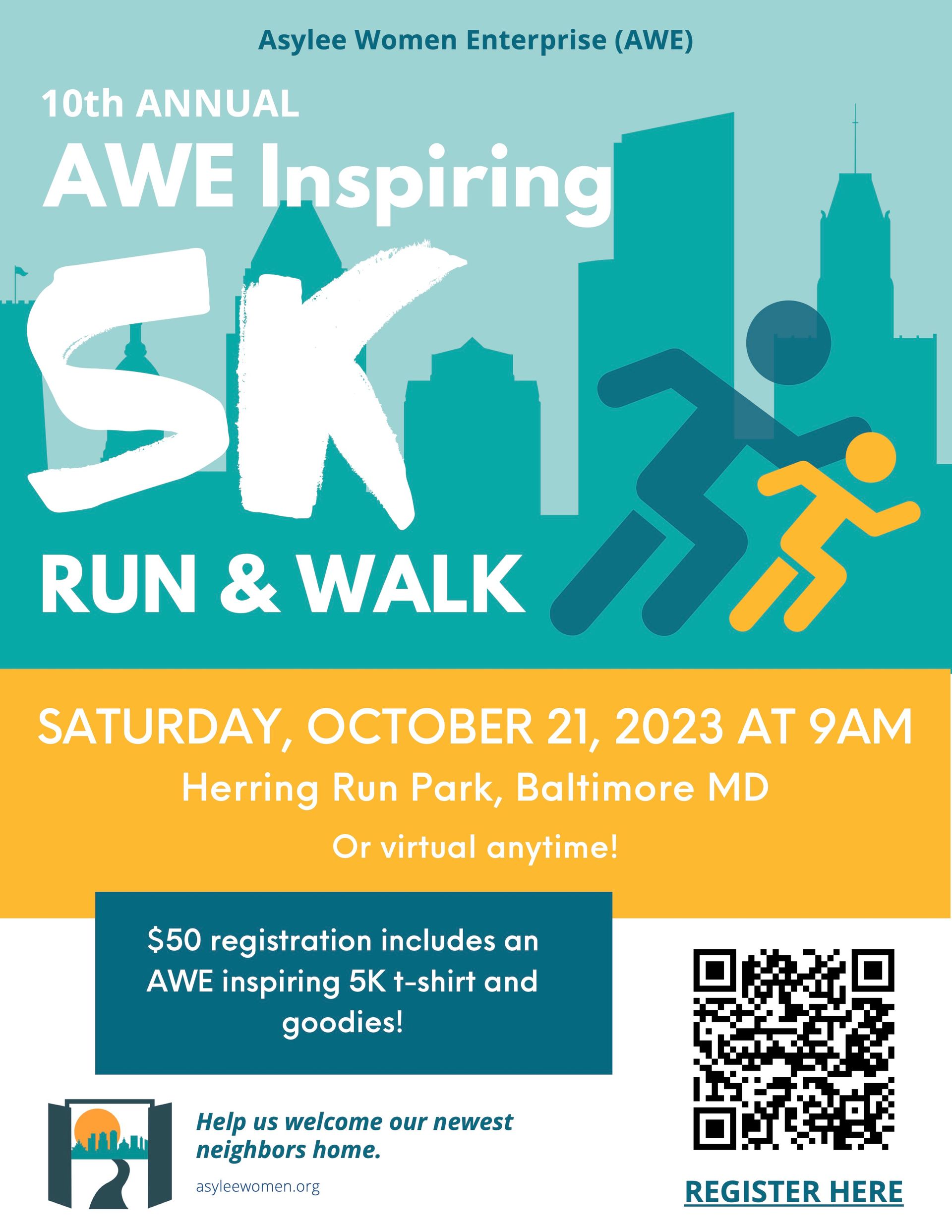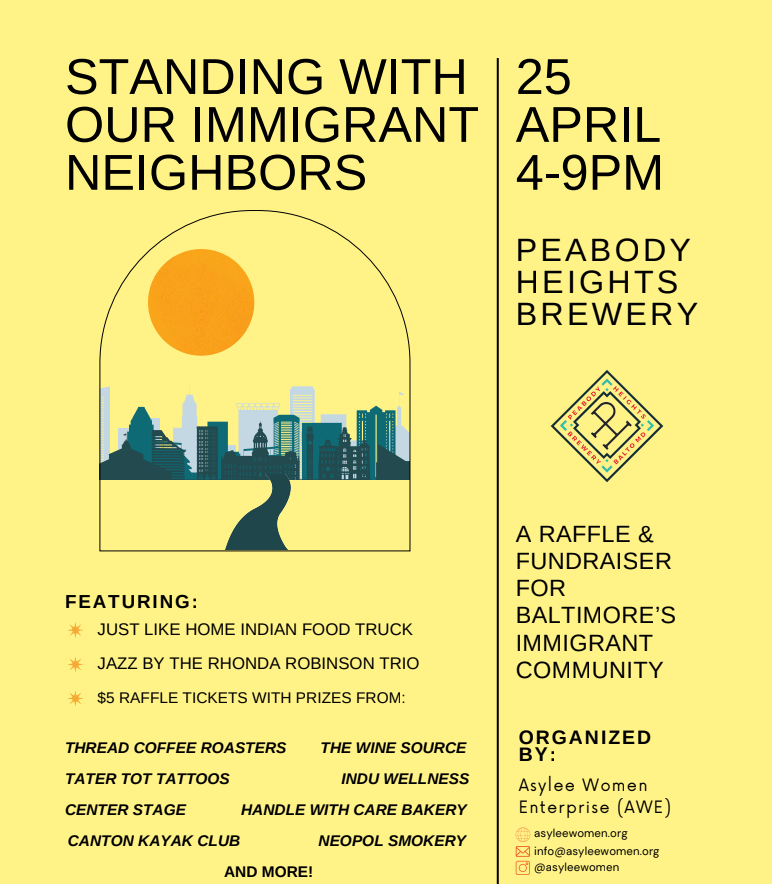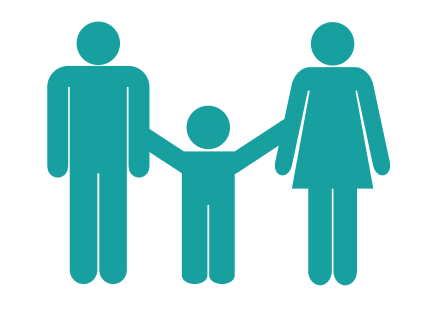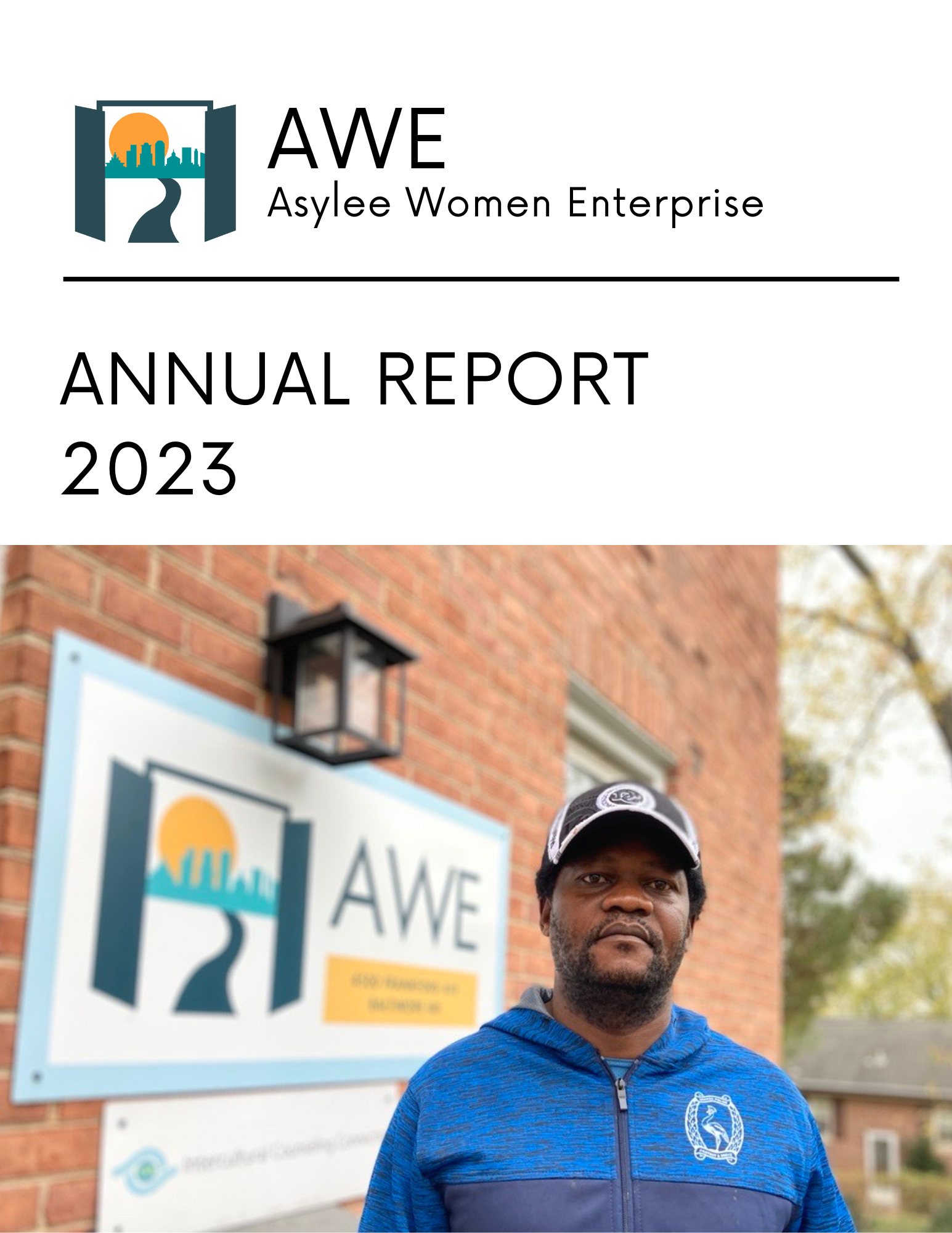Join us for our 10th Annual AWE-Inspiring 5K on October 21, 2023!
May 31, 2023
Help us welcome Baltimore's newest neighbors home and sign up for AWE's 10th Annual 5K Run and Walk! Registration includes an AWE-Inspiring 5K t-shirt and goodies!
Share this post
All News and Events
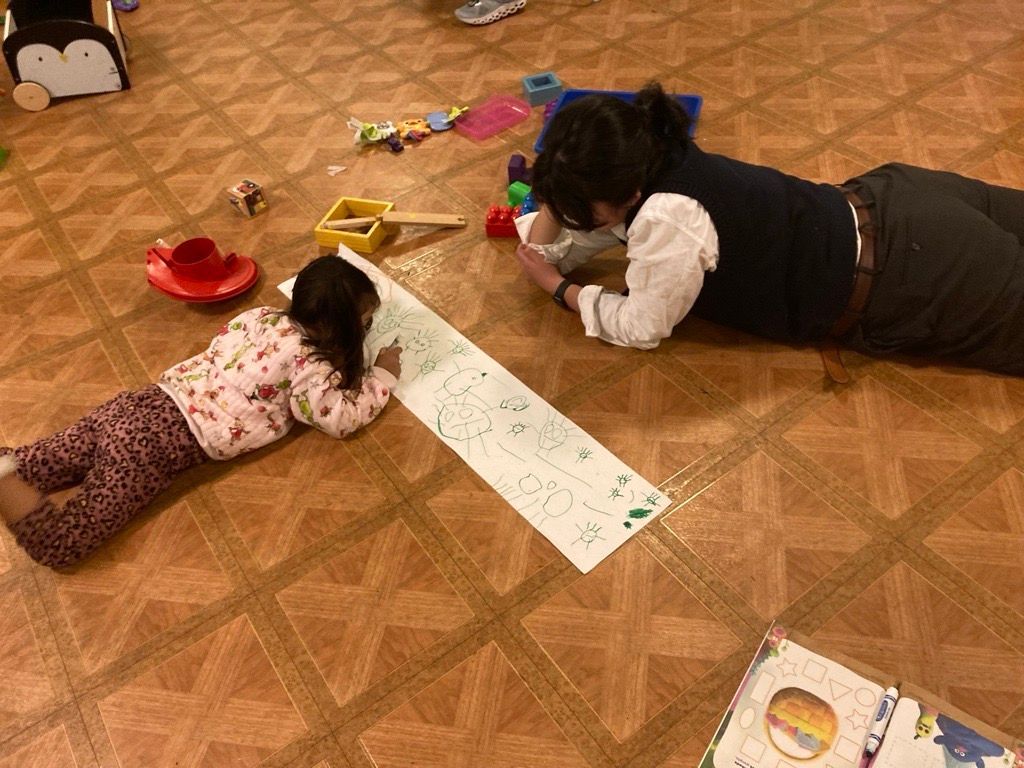
We complete satisfaction surveys with every client throughout their time at AWE. One question we always ask is, “What is the most impactful aspect of our services?” Overwhelmingly, clients mention the sense of community and welcome. Community is at the heart of our work, and we are committed to creating a warm, welcoming, and supportive space for everyone we serve. Clients, volunteers, staff, donors, and partners are all essential parts of the AWE community. But what exactly do we mean when we talk about the AWE community?
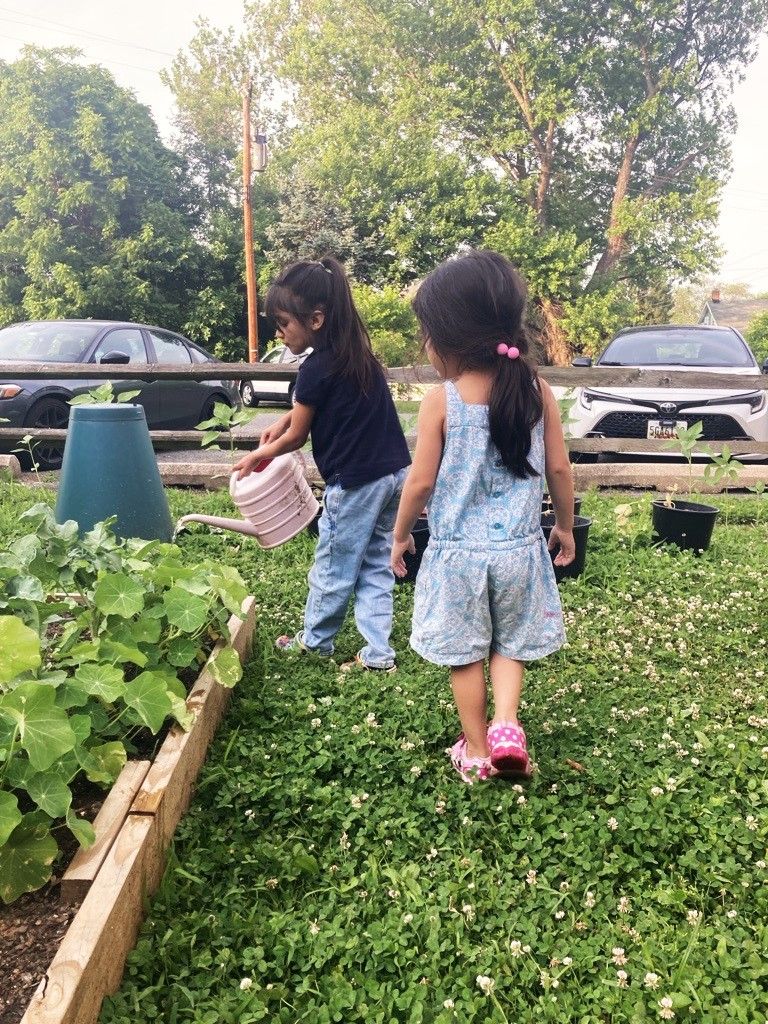
Maria fled violence in Central America with her two small children and came to the US seeking safety. Soon after she arrived, an acquaintance in Maryland offered her a place to live and help finding a job. But once here, Maria and her daughters were locked in a room, and she was only allowed to leave to work. Her traffickers forced her to use fake identity documents and hand over all the money she earned. They threatened to deport her and hurt her family back home if she tried to escape. Maria and her daughters eventually escaped, and a few weeks later, she showed up at AWE asking for help. We quickly enrolled her and began providing wraparound support for the family. Maria is now working with a lawyer to apply for a T Visa—a form of immigration relief available to trafficking survivors who cooperate with law enforcement to investigate and prosecute their traffickers. Maria is one of thousands of immigrant adults and children who are trafficked in the US each year. Without permanent immigration status and often unfamiliar with the language, culture, and laws of their new country, immigrants are especially vulnerable to exploitation and abuse.
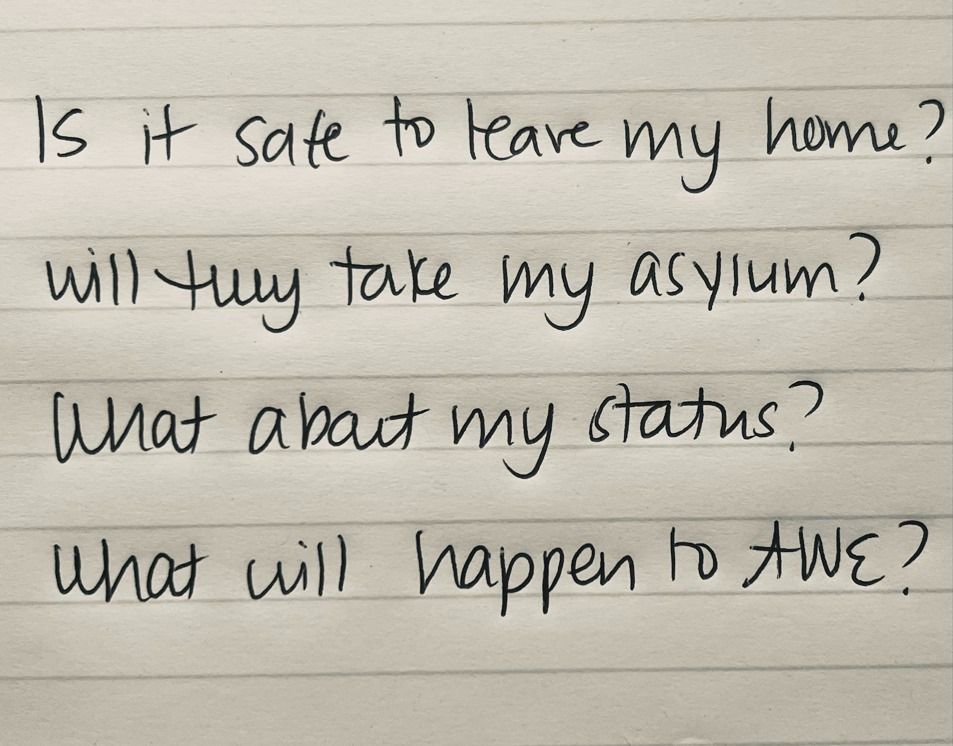
On the morning of November 6, AWE staff gathered to discuss the outcome of the election and begin to process the impact of the results on our organization and our clients. The room was heavy with shock and sadness, but also a resolute, quiet tenacity. We didn’t know if our clients would feel safe coming to class, but we were grateful that almost twenty clients did. Before lunch, clients, staff, and volunteers gathered in our community room. French-speaking clients sat in the front of the room on the left, Arabic-speakers on the right, and Spanish speakers in the middle. Staff members fluent in these languages sat within each group to interpret. English speaking clients, volunteers, and staff were sprinkled across the rest of the room. AWE’s executive director addressed the group, pausing for interpretation as she spoke. She shared our sadness about the news and assured clients that AWE is not going anywhere. She promised that AWE will continue to provide clients with accurate information about their rights and changes under the new administration that may impact them. She also promised that AWE will continue to be a safe space for our clients, and that we will keep advocating for a world where they are welcome and safe. When she asked if anyone had questions, multiple hands shot up. “Is it safe to leave my home?” a client asked. “Will they take my asylum?” someone else asked. “What will happen to AWE?” multiple people questioned. We don’t have all the answers, and we have fewer assurances than we’d like. Trump has vowed to implement sweeping inhumane and unjust policies that would profoundly threaten the lives and safety of forced migrants everywhere, but a lot of details are still unclear. We do know, however, that we will continue to gather in the community room every few weeks to listen, answer questions, and provide accurate information. In the coming weeks, we will also help clients submit applications for asylum and other forms of immigration relief, help clients develop safety plans, provide Know Your Rights Trainings, and seek out additional funding to ensure our services remain sustainable and responsive to changing needs of the communities we serve. We will also continue to create spaces where our clients feel seen, heard, and safe. Where they can express their anger, fears, and hopes. Where they know that they aren’t alone. We will do everything we can to a place where people feel safe, and where immigrants are welcomed with dignity. We hope you’ll join us.

AWE welcomes dozens of asylum seekers and trafficking survivors through our doors each week. Clients attend classes, share meals, meet with their case manager, and fill bags with groceries, diapers, and clothing to take home. Many clients also access mental health services, including individual counseling, group therapy, and other therapeutic activities like acupuncture, gardening, and yoga. Our clients arrive in Maryland after protracted periods of trauma. Many fled war, persecution, forced displacement, and human rights violations. They often experience additional violence on their journey to the US. In 2020, Doctors Without Borders reported that 48% of forced migrants experienced sexual violence on their way to the US and nearly a third were kidnapped at some point during their journey. But once in Maryland, clients face many barriers to healing. Accessing interpretation for therapy can be challenging, and many providers don’t have experience working with forced migrants. Meanwhile, most clients are ineligible for Medicaid and without work authorization they can’t afford private care. But without treatment and support, trauma can have long term consequences and symptoms can get worse. PTSD and depression can make it difficult to focus on finding housing, securing employment, and navigating the immigration process. Meeting the mental health needs of our clients is a critical component of our work. We recognize that healing looks different for different people, so we provide many different types of support. We also work to remove the many barriers our clients face to receiving the support they need. Individual therapy is a big part of what we do. In 2013 we began partnering with the Intercultural Counseling Connection (the Connection). The Connection, which is collocated with AWE, is a referral network of pro bono mental health professionals that connects our clients to individual counseling. In 2022, we started partnering with HEAL Refugee Health and Asylum Collaborative (HEAL) to provide individual therapy to our minor clients onsite. We also partner with a private, Spanish speaking therapist who provides therapy to youth trafficking survivors. In 2024, 48 clients have accessed individual therapy through our partnerships. Many clients also participate in group therapy. The Connection leads biweekly group therapy sessions for adults and HEAL leads biweekly group therapy for Spanish-speaking youth. Groups provide safe and inclusive spaces where clients can address concerns and develop interpersonal connections with each other. Meals are provided before all sessions and clients leave with groceries, diapers, and toiletries. So far in 2024, 79 clients have attended group therapy at AWE, including 45 minors and young adults. Many clients also access alternative forms of therapy. AWE offers bodywork activities like acupuncture, massage therapy, and yoga, to help clients release stored tension, reconnect with their bodies, and process emotions that may be difficult to access through verbal therapy. Community gardening, nature retreats, and music and dance therapy can help clients decompress and connect with each other. More than 70 clients have participated in alternative therapy in 2024. We make sure that clients can access all these services. We provide bus passes for clients attending daytime group activities and ride shares for evening events. We prioritize working with therapists and group facilitators who share the cultures and languages of our clients, and we always provide interpretation when needed. We do all of this because we believe our services are most impactful when they’re holistic and client centered. Offering different types of mental health services and making sure they’re accessible, ensures our clients have the resources and support to rebuild their lives with safety, trust, and empowerment.
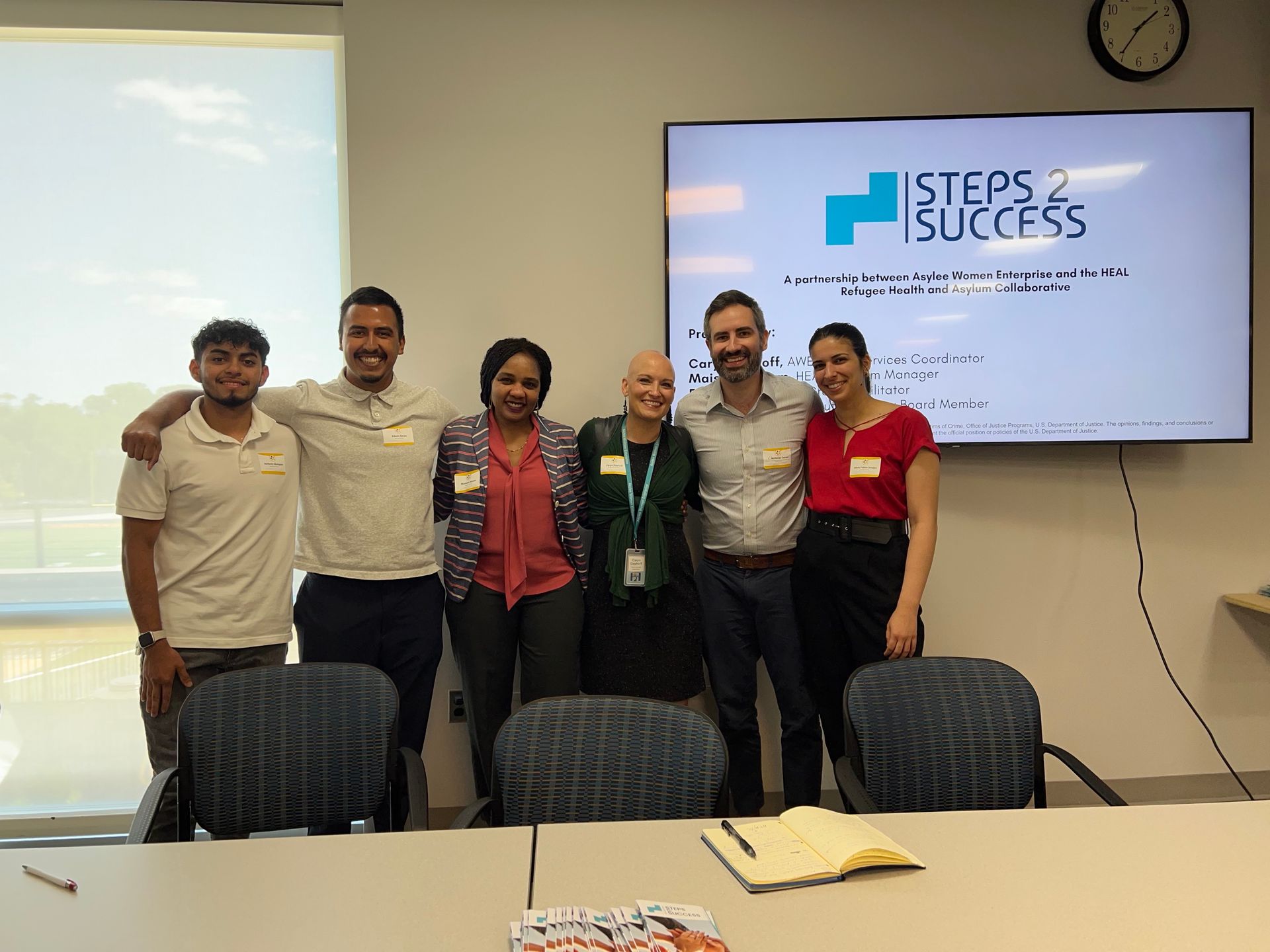
It was a busy summer for our youth program Steps to Success! Between June and August, we held biweekly group therapy sessions led by the HEAL Refugee Health and Asylum Collaborative and we arranged field trips to the Baltimore Museum of Art and the Maryland Museum of History and Culture. We also took clients sailing with Pride of Baltimore and held a nature retreat at Bliss Meadows Farm. Thirty-six teenagers and young adults participated in summer activities. We also continued to develop our Youth Advisory Board. We created the Youth Advisory Board in 2024 to help guide our youth program and make sure it aligns with the needs and interests of our clients. Four trafficking survivor youth agreed to join the board, and we held the first board meeting in April. Over the next few months, board members established the purpose, rules and responsibilities of the board and began to identify ways to improve and expand Steps to Success. They also expressed interest in giving back to the community. After some brainstorming, they pitched the idea of creating a mural in Baltimore which they hope will reflect the presence and experiences of Latino youth in the city. The board will start working with a local community arts program this fall to design and create the mural. Youth Advisory Board members are also encouraged to develop professional development goals for themselves. Recently, when the board members asked for education around personal finances, AWE identified a financial coach to provide one-on-one support and help them develop personal budgets and learn about credit. Board members have also sought out opportunities to share their stories and experiences with the public. One board member participated in a mini documentary about her journey to the US. Another board member was interviewed for an article by the Johns Hopkins Children's Center Magazine. In May, a board member named Anthony participated on a panel at the Baltimore Immigration Summit with AWE and HEAL. Anthony spoke about Steps to Success and how the program is a safe place for him to process the trauma he’s experienced. He could not imagine his life without the program, he told the panel attendees. When Anthony joined Steps to Success in 2023, he was skeptical about some parts of the program, especially the biweekly group therapy sessions. Now, however, Anthony attends almost every Steps to Success event, sits on the Youth Advisory Board, and provides guidance and support to newer program participants. He has quickly become a leader in the program and within the wider, Baltimore Spanish-speaking immigrant community. Steps to Success has grown rapidly since its creation in 2023. Fifty-nine immigrant, Spanish-speaking youth are currently enrolled in the program, including 37 trafficking survivors. The program has organized over 50 activities in 2024 alone. The Youth Advisory Board is a critical part of the program’s success. Board members, who commit to a year of board service, take their responsibility very seriously. We originally planned for the board to meet bimonthly, but members quickly asked to meet every month instead. Members never miss a meeting, and everyone arrives with thoughts on how the program can improve. Outside of meetings, board members interact over an AWE-monitored WhatsApp chat – sharing resources and ideas with each other. The success of the Youth Advisory Board highlights the importance of safe, inclusive spaces where immigrant youth can share their experiences and expertise, develop new skills, and engage as equal partners in the creation and implementation of services. It also speaks to the talent and creativity of the board members, and their dedication to creating a stronger, supportive, and more welcoming city.
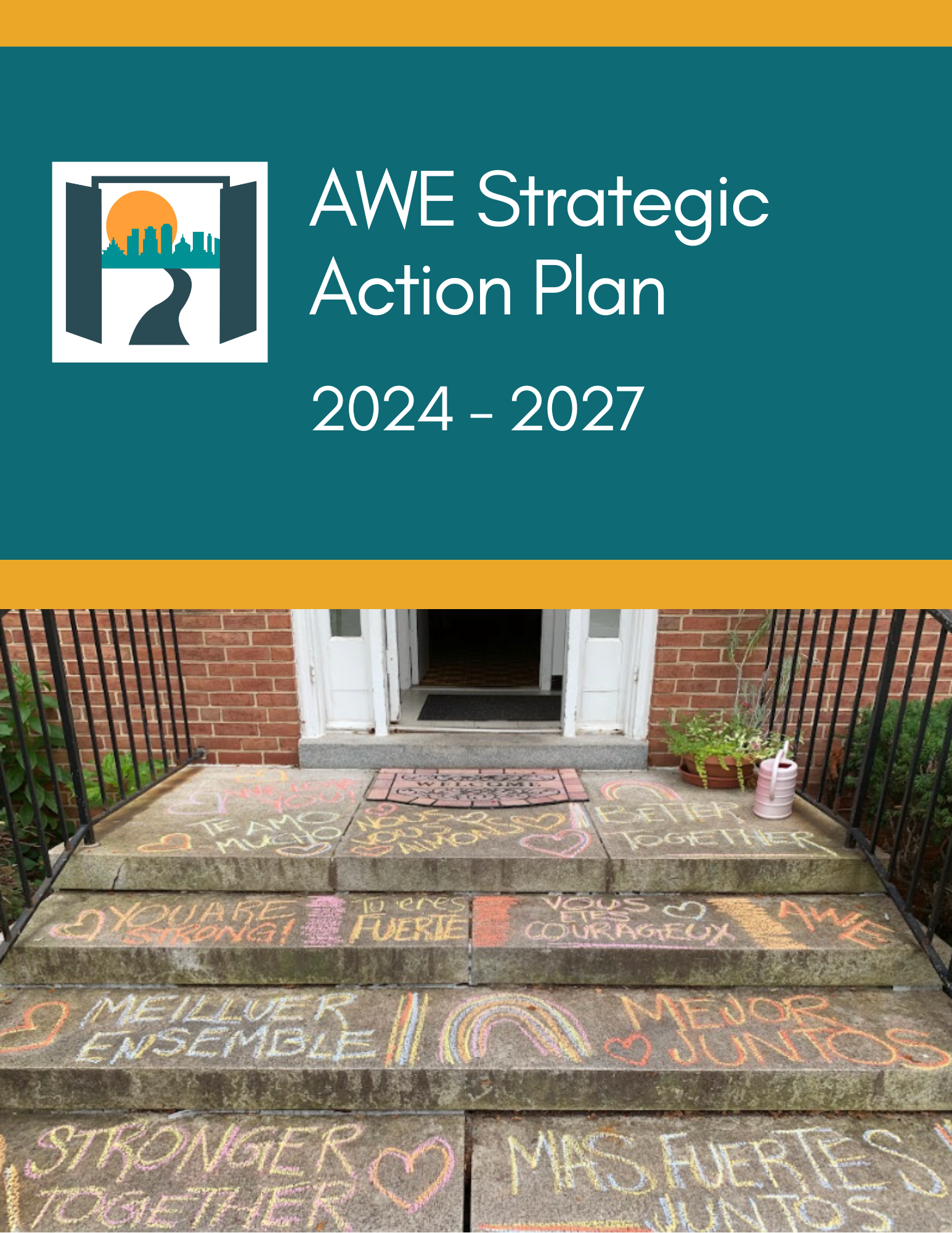
Dear friends, Displaced by violence and hardship, an unprecedented number of people are forced to leave their homes each day and seek protection in the United States. Asylee Women Enterprise (AWE) is committed to serving forced migrants, offering them essential support and advocating for their rights and dignity. This three-year strategic action plan (2024-2027) outlines our roadmap for navigating the complexities of forced migration and amplifying the voices of those we serve. It reflects our understanding of the obstacles forced migrants face, their endurance and strength, and our shared hope for a better future. Over the next three years, we aim not only to continue providing essential services to forced migrants, but also to enhance our capacity, expand our reach, and advocate for changes that protect the rights and dignity of those we serve. As we begin this three-year journey, we hope you will partner with us, give your voice to our cause, and support our efforts to create a more compassionate and welcoming world where everyone can live in safety and with dignity. Together, we can make a difference. Together, we can welcome Maryland's newest neighbors home.
